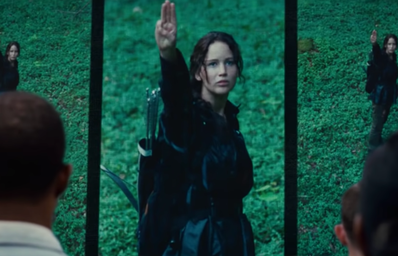If you’re anything like me, you’ve been rewatching or rereading The Hunger Games. I’m not sure who I can thank for this: Netflix advertising the series’ removal starting March 31st, Tik Tok’s obsession with the franchise, Taylor Swift for releasing the (Taylor’s Version) of her songs from the iconic soundtrack, or the already growing anticipation for the prequel movie, The Ballad of Songbirds and Snakes, set to hit theaters on November 17th. No longer the chubby-faced 5th grader excited to braid her hair, learn to shoot a bow and arrow, or buy posters of Gale to paper her bedroom walls with (I’m not sure what’s more embarrassing, admitting that I used to be Team Gale or imagining telling my 5th-grade self that now I’m more Team Clove) rewatching the Hunger Games movies did not just bring about the usual nostalgic feelings of loving something you’ve loved before. This time, I was struck with an unsettling feeling that the images on my screen from Collins’ fantasized Panem and the horrors of the Games were reflections of my present-day, very-much-not-futuristic newsfeed.
Panem, in the film franchise, but especially in the books, is a decadent society that is a slap-in-the-face to characters like Katniss, who were raised with hungry bellies in cities of immense poverty. Everything exists in excess in the Capital of Panem: clothes, food, entertainment, and money. So much so that those from the districts show great disgust for the Capital’s fondness of medical beauty modifications, drinks designed to make one vomit to enjoy more food, the use of The Hunger Games (in which children battle to the death on TV) as entertainment, and the jewels, homes, and lifestyle that are the staples, and one might even claim ‘essentials,’ of Capital residents.
I invite you now to examine American society, especially the lives of the immensely wealthy. A growing wealth gap in the United States eerily echoes the immense divide between the Capital and the Districts. The economic top of American society today already dons utterly useless fashion choices like, to name just one, Doja Cat’s appearance at Schiaparelli’s 2023 Paris Fashion Week event. Her dress and make-up look, which sported 30,000 crimson Swarovski crystals, would not look very much out of place in Panem’s Capital. For celebrities and influencers, like the Kardashians, rumored use of drugs like Ozempic and Wegovy to facilitate dramatic weight loss mirror the Capital’s obsession with staying thin in contrast to the District’s battles with starvation. We may not yet pit children against one another in a televised battle to the death for entertainment, but we do have strange ways of entertaining ourselves.
If Hollywood’s and Panem’s increasingly extravagant & bizarre fashion choices weren’t enough to convince you that Collins might just be talking about us in the series, then let me present you with a series of chilling images. First, think of when Katniss’s sister is reaped into the Games. When Katniss volunteers to take her place, her District meets her not with applause but with a silent three-fingered salute. This image of a crowd raising their fists in solidarity with the brave is not an unfamiliar image in our very much real world.
The themes of inequality and revolution in The Hunger Games that are so similar to the inequalities in our nation today were cheapened by Hollywood’s focus on Katniss’s love interests and the theatrical horrors of the Games themselves instead of allowing for a realization that the kind of society that allows the killing of kids for fun is not so very different from ours.
While Suzanne Collins pulls her inspiration for the series from many aspects of her life, she points to one instance in particular. Collins remembers relaxing at home, flipping between reality tv shows and footage of the Iraq war. This unsettling combination led her to the initial idea for the series.
Hunger Games fanatics of the past have since been presented with many similar images as they grow into adulthood. One simply must recall watching the news as Russian tanks rolled over the Ukraine border. Between footage of refugees and air raids, one was likely to also be presented with an Applebee’s commercial or a snippet of Love is Blind.
Clearly, an aspect of the games is very real. The three-finger salute used by rebels in the districts of Panem has been adopted by protesters protesting authoritarian rule in Asian countries like Thailand and Myanmar. The salute, first seen in 2014 in Thailand, was also used in the Hong-Kong protests of 2021.
If, in 2008, when the Hunger Games first appeared, Hollywood had ignored the love triangle or the romantic subplots and focused instead on the bravery of the resistance movement and Katniss’s revolutionary actions, what other conclusions would we have come to? Is the fact that 5th grade me proudly proclaimed herself as Team Gale a natural conclusion of the story that Collins told? Or is that what Hollywood and media outlets wanted me to conclude? If the movies and the hype around them had focused on the story’s themes, would I have instead declared myself Team Democracy or Team Rebel? Did Collins’s true revolutionary message get lost in the wave of Hollywood hype?
It seems that Hollywood, like Panem, wants us to forget they’re entertaining you with a story centered around children killing children. The jewels, the love, and the heartache are all easier stories to swallow than the atrocities of corruption, exploitation, and the literal death games Collins presents us with.
Watching The Hunger Games as an adult, but also as an adult who has lived through and with massive social unrest, war, and pandemic, centers the message of The Hunger Games much differently. As you return to Panem, I challenge you to recenter Collin’s inspiration for the series. Enjoy the timeless love stories, but look beyond them too. Watch as a 16-year-old takes down a totalitarian regime and observe how those themes of revolution and suppression are themes in our lives too. When the prequel hits theaters in November, relish in the fictional heartbreak, but also examine just how easily Panem’s dictatorship was built and what, if anything, could have been done to stop it. When entering the world of The Hunger Games in 2023, will we all now realize the Panem-like qualities of our current society? Or, will we be again distracted by the bread and circuses of Hollywood entertainment? Will this last release from The Hunger Games finally center internet discourse over the question: What kind of society kills kids for fun? Is it just Panem’s, or could it be ours too?


